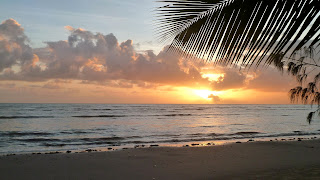My Mum was a stargazer who, on cold Northern winter evenings, would take me outside to look at four tiny dots around Jupiter (its Galilean moons) and a slight bump on either side of Saturn's disk which, she explained, was a glorious ring system. The telescope wasn't high magnification and could at best reveal only a fuzz of a nebula in Orion's sword, but it was exciting to explore nevertheless. I went on to study Astronomy as a subsidiary subject at uni, and got my first editorial break in publishing when the Science and the Universe editor took off for India and I was the only person who could tell whether photos of constellations and cosmic phenomena had been flopped!
My Mum always wanted to see a total eclipse of the sun, and I promised at a young age to take her to the tip of Cornwall on 11 August 1999 for the first total eclipse in the UK since 1927. It was nine days before what would have been her birthday; but she'd died nine years before the eclipse. I didn't go without her – it didn't seem the same, somehow. The weather was typically August holiday weather: few spectators had a cloud-free eclipse experience. I watched with colleagues on Waterloo Bridge in London where, despite 96 per cent totality and high cloud, it remained disappointingly light. The quality of the light was strange, however; nothing like it is at sunrise or sunset. It's often described as metallic, or silvery: it's unique, for sure. And I was surprised to see the event revealed in shadows on the ground: beneath leafy trees there were crescent shapes as the gaps between leaves acted as pin-hole projectors.
Long before we knew we were coming to live in Brisbane, we'd planned a holiday in Far North Queensland to coincide with the 2012 total eclipse. Once here and settled, I got down to planning our eclipse trip to Port Douglas. Some accommodation was already booked out, by mid-2010.
I'd realised from the outset that mid-November is on the verge of the Wet, and that cloud might be a spoiler. But I dismissed it from my mind. Not in the Sunshine State, surely? The weather forecast looked a bit iffey the week before. But there's none so deaf as those who don't want to hear. On Tuesday, Four Mile Beach looked more like the northwest of Scotland than Far North Queensland; but I couldn't believe things wouldn't go according to plan the next morning. When I posted the picture below a friend advised me to go inland; she warned me against meteorological unpredictability in Port Douglas. But I fancied the idea of watching the eclipse from a stunning palm-backed tropical beach rather than taking my chances along some highway heading inland to Mt Carbine (Mt Carbine?!). We'd read that it was better to view from (low down on) the coast. Locals only told us after the event how clear it had been just a little way up the Mowbray River. We were about to make a monumentally wrong decision.
Wednesday morning was still dark as we drove past people heading for the northern end of Port Douglas's famous main beach. We drove on empty roads to the southern end, which we'd identified the previous day as our preferred spot. As the sun rose about 5.30, it dipped in and out of clouds dotted along the horizon, but not ominously so, at first. To the south what looked like a storm was headed for Cairns. As the sun rose, we realised we'd missed the start of the eclipse: we caught tantalising glimpses of the crescent sun – through special viewing glasses, of course. My friend was having difficulty with the filter we'd driven to the Gold Coast to procure the previous weekend: it wasn't dark enough.
The countdown to totality became increasingly stressful as the sun appeared sporadically in holes between clouds that seemed to be travelling at the same speed and in the same direction as it was. Suddenly, the light was weird; substanceless, faded. It was getting dark again, barely an hour after daybreak. We couldn't hear if the birds had been silenced; just the sound of waves breaking and a low excitable hubbub. And then it was almost dark. Spontaneous applause broke out among our fellow observers. The eclipse was total, but a great big slow-moving cloud blocked the pièce de résistance that I seemed to have waited so long for. No Diamond Ring Effect; no Bailey's Beads. But bright Venus shone like a gem in a clear patch of sky.
I can't quite describe the disappointment. It morphed from disbelief to anticlimax to resentment to cheerlessness. I should have fancied champagne with my breakfast: instead, I listened to a couple from Victoria on the next table describe their clear view from Mt Carbine and their enjoyment of their third total eclipse. 'S not fair.
I saw a partial eclipse, which I've seen several times before. I marvelled at the changing light, as I'd done in London. A new aspect did strike me about the phenomenon, however: the sun took on the characteristics of the moon that was concealing it. We were briefly on the beach in moonlight on a partly cloudy night.
My camera could only cope with the sun when it was behind clouds, which really did have silver linings. Below is what I saw... and then I started planning our trip to the US in 2017. It's unfinished business. And hopefully I'll identify a location that will as near-as-dammit guarantee us a completely clear sky.
November 18, 2012
Subscribe to:
Post Comments (Atom)





























Your next total solar eclipse expedition will be twice as what this one was supposed to be.
ReplyDelete